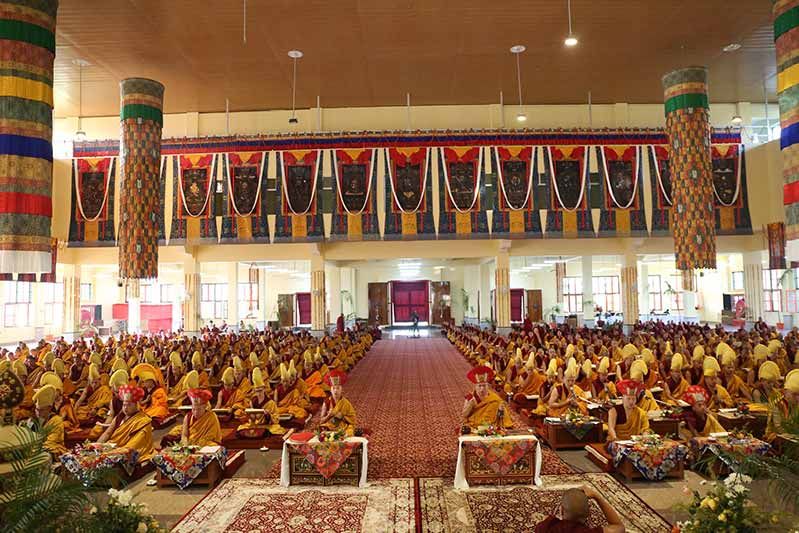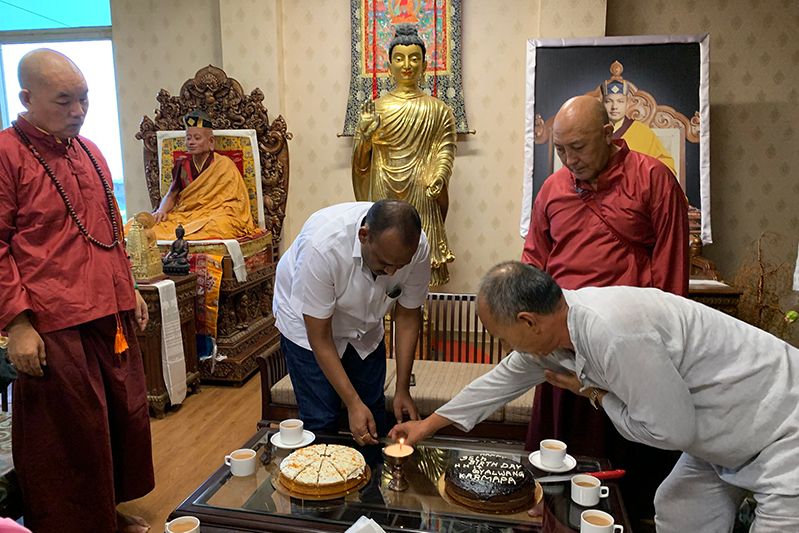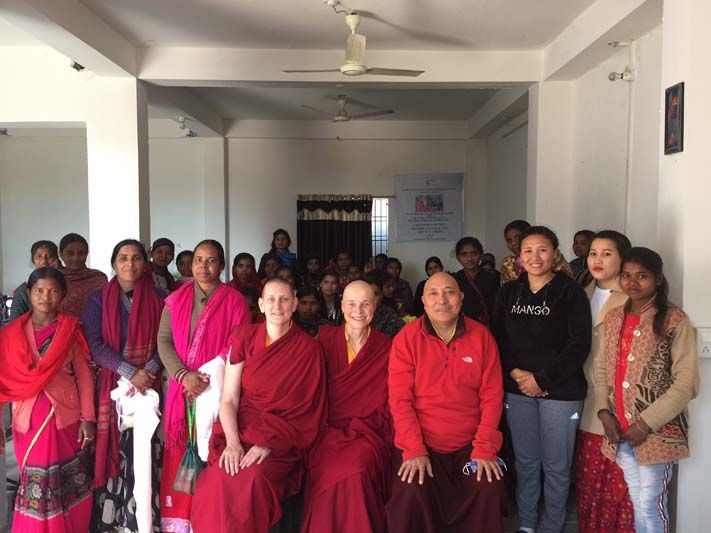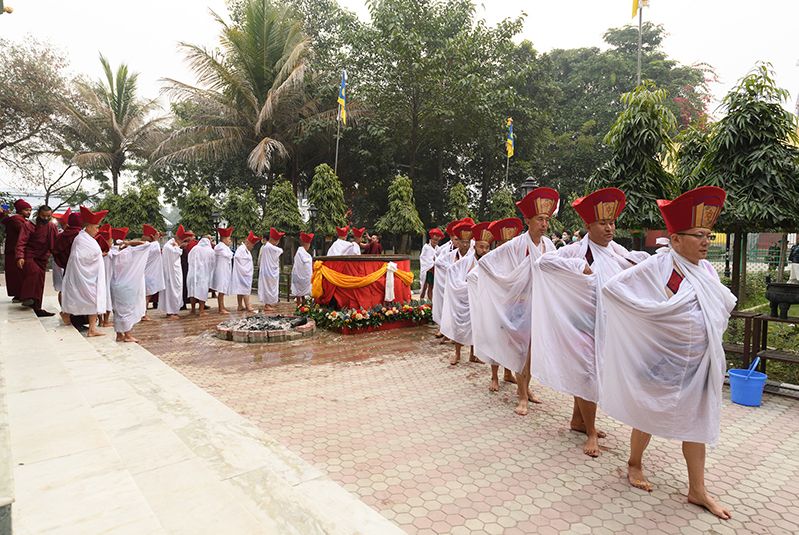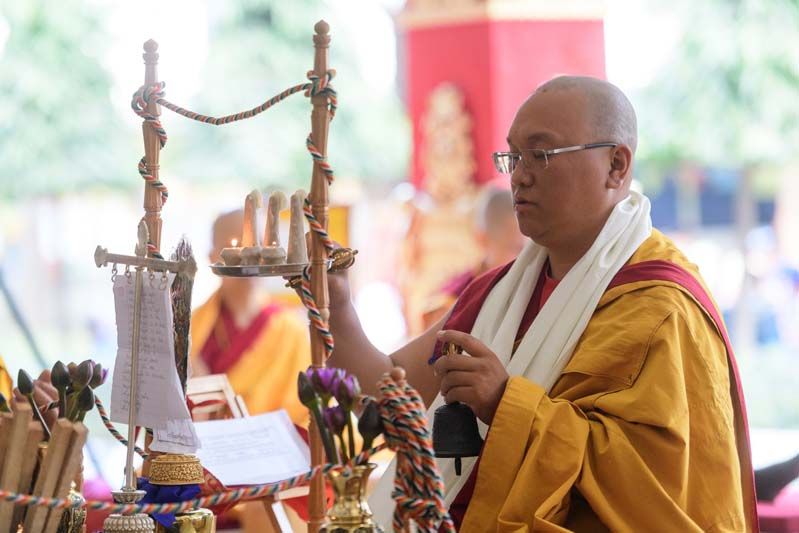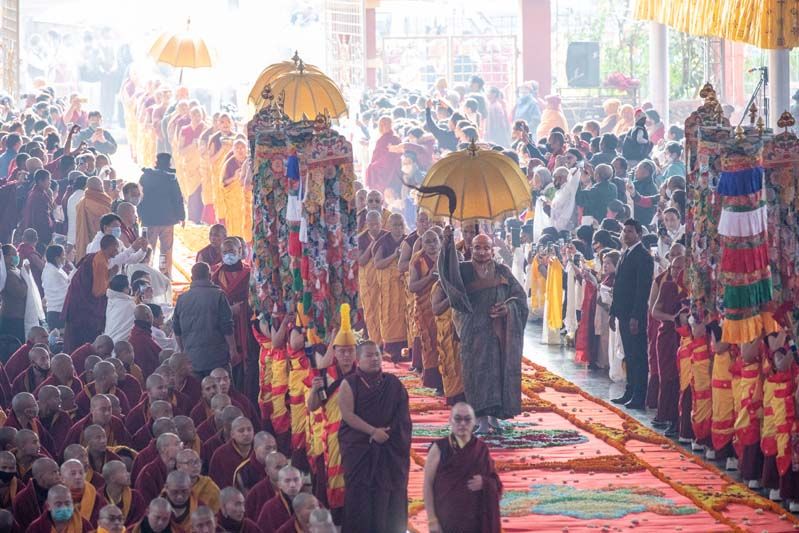HE Goshir Gyaltsab Rinpoche on Mind Training: The Seventy-Two Exhortations: Day Three: “Follow the Mahasiddhas’ Footsteps”
- February 4, 2020
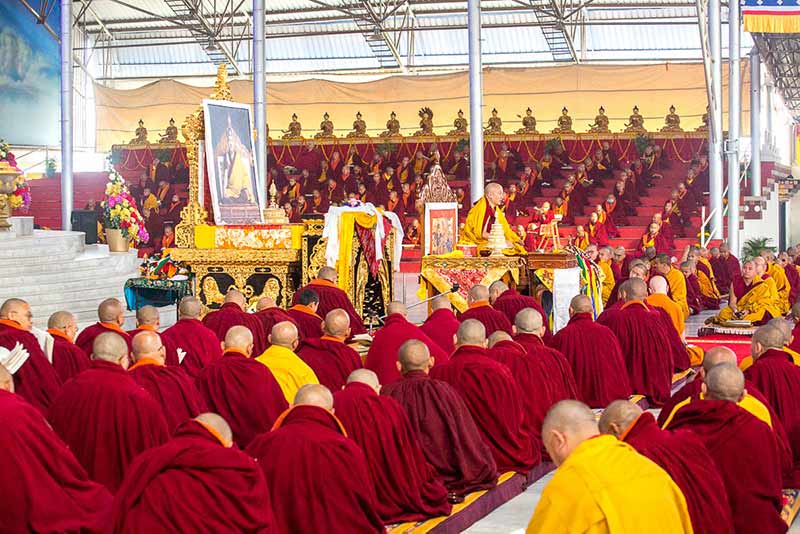
Monlam Pavilion,
February 4, 2020
Following a long stream of generous students making offerings, during which the assembly chanted the Supplication to the Lineage of the Bodhisattva Vow, the teaching began. Having laid the groundwork for this teaching on the first day, and having covered the initial verses, “Virtue in the Beginning,” on Day Two, His Eminence Gyaltsab Rinpoche today addressed the main portion of Kharak Gomchung’s Mind Training: The Seventy-Two Exhortations, ”Virtue in the Middle.” He covered Verses 15-37 in just over an hour, lending further credence to the character of the text as a pith instruction.
Kharak Gomchung’s emphasis in this section of the text is that practitioners not deceive themselves or others; that they fully train and tame their minds by following the examples of great practitioners of the past and an authentic guru; and that they sever preoccupations with the eight worldly dharmas.
Rinpoche began by reminding all to generate bodhicitta and to contemplate our impending death. We should practice the dharma for our future lives. Beginning with Verse 15:
Without reversing from deep within
Desire for appearances—sensory objects—
Do not act to deceive laypeople
By faking a wish to be venerable.
Even though we are in the desire realm, we should sever any attachment to the five sense pleasures, recognizing their nature as impermanent. He noted that those dharma practitioners who haven’t cut attachment within the mind are no different from worldly people who have never encountered the dharma at all. Such people pretend to be venerable monastics when they are around others. He quoted the text: “Do not act to deceive lay people.” Verse 16:
Unless you have conviction in your mind
About the sutras and tantras the Buddha taught,
Don’t be so proud and delude yourself
By clinging to jargon and words.
Rinpoche emphasized the importance of listening, contemplation, and meditation in dharma practice. It is not enough to know the words of the sutras and tantras. We must avoid self-deluded conceit and pride, thinking we sound knowledgeable. Rinpoche encouraged us, for the third time over the course of this short teaching thus far, to read the Jataka Tales, the stories of the Buddha’s former lives, in order to develop certainty in our path. He reminded us that dharma practice is meant to gradually transform us and cannot be rushed. Instant results are impossible because, since beginningless time, we have cultivated afflictions and obscurations in our mind-stream. Thus it is a gradual process to discard them — it doesn’t happen immediately. We cling to so many different types of misconceptions: ego clinging, the belief in permanence, and so forth. These vary a great deal from person to person; there are a vast number of deluded perceptions. Rinpoche noted, “We each have our own way of clinging. As we meditate, gradually the obscurations become thinner and thinner and we can develop realization. Eliminating the obscurations and developing our mind takes a long time.”
Ingrained from beginningless time,
Misconceptions are not discarded at once,
So don’t expect excellence too soon—
Develop your mind gradually. [Verse 16]
Doing studies competitively,
Being a teacher for fame, and speaking
With the pride of wanting to be erudite:
Think—can these three become dharma? [Verse 17]
There is no benefit in teaching others
What hasn’t arisen in your own mind.
You should be ashamed of yourself,
So do not sell the true dharma for gain. [Verse 18]
The text next emphasized correct study and practice. We must not think that merely knowing the words makes us learned; we need to contemplate the meaning, ask questions, and gradually come to a correct understanding. We should avoid any kind of competitive mentality, the wish to be first or to achieve higher status. And in order to benefit others, when we give instructions, we have to have experience ourselves in order for them to be fruitful. Rinpoche commented that one could give a lot of dharma teachings and then suddenly, one day, realize that one has no idea what they actually mean, and become very embarrassed. He summarized: “Don’t sell the dharma for gain or respect.”
Not feeling truly weary with the world,
You keep the eight concerns in your heart
And feign renunciation to others—
Do not grumble so much. [Verse 20]
Your mouth has great faith; inside, you have little.
While thinking you’ll do something, you’ve grown old.
You are quick to start but slow to mature.
Meditate on being disgusted with yourself. [Verse 21]
In this section, Kharak Gomchung emphasizes the problem of not carrying things through. One might tell others to renounce worldly life without truly giving rise to renunciation oneself first. Or, one might appear faithful but have little authentic faith inside. A sign of this is that you plan to meditate someday, but that day never really comes, and meditation practice is always put aside for some other more pressing matter. Rinpoche commented, “There’s never any time to meditate; you have to make the time, in your mind. Otherwise, you’ll just get old without ever doing it.” He added that the right antidote to these various faults is to practice the correct level of instructions when you start in the dharma. Many practitioners aim too high at first, attempting practices for which they aren’t ready. As the text says, such people are “quick to start but slow to mature.” The result doesn’t ripen, Rinpoche noted: “Someday you will look back and be disgusted with yourself.”
Just as the nature of fire is hot,
The nature of beings is to have faults.
Instead of thinking of others’ flaws,
Consider your own and give them up. [Verse 22]
Next, the text instructs practitioners in how to see, frame, and work with experiences. Just as the nature of fire is hot, the nature of sentient beings is to have many faults. We tend to notice others’ shortcomings, but we should abandon such thoughts. Rinpoche commented that we shouldn’t be surprised or upset by others. Since fire’s nature is to be hot, this shouldn’t upset us. There is no benefit in criticizing water for being cold and wet. Similarly, when we notice someone who is angry, that is the nature of anger manifesting — it is disturbed — it is harmful — and there’s no point in criticizing the sentient being who is overcome by the nature of anger. He added that desire and pride are selfish by nature, and there’s no point in criticizing them for being like that. The skillful emphasis here was on the kleshas (the disturbing emotions) themselves, rather than on the person in whom they manifest. Rinpoche explained that kleshas are adventitious — they arise due to conditions. As fire arises in specific conditions, so is it with anger or pride. When the conditions are removed, they cannot arise. If we look at people’s mental continuums and see only their flaws, our own kleshas and disturbances will only grow. We should instead understand the nature of kleshas, and respond with compassion to those who suffer from them.
The next topic in the text is the behavior of gurus and the proper way to relate to it. Kharak Gomchung writes in Verse 23-24
The behavior of a Mahayana guru
May not look good on the outside,
But you don’t know their innermost thoughts,
So do not ponder the guru’s faults.
Any thought in your mind is clear
And unobscured to the buddhas’ wisdom.
Don’t let bad thoughts that would offend
The yidam deity stir in your mind.
Rinpoche commented that many realized siddhas of the past behaved quite strangely by our standards. Since one cannot read the mind of another, and since bodhisattvas will use any method needed to tame or help another being, there is no use in judging.
On the other hand, our own thoughts and behavior are fully visible to the Buddhas and bodhisattvas at all times, so we should take care to clean them up. Rinpoche commented that dharma practitioners should make confessions every day, via Vajrasattva or whatever liturgy they know, for the faults that arise in our minds and that can offend the yidam deities we practice. He noted that most practices contain some version of the 7 branch prayer, which includes the branch of confession; bad thoughts should immediately be cut, confessed, and abandoned.
Like sighted people among the blind,
The buddhas and the bodhisattvas
Always see with unobscured vision.
Do not behave badly in private. [Verse 25]
Similarly, we should monitor our body and speech just as carefully. We should act well in private as well as in public, for the Buddhas are all-seeing.
Next, Kharak Gomchung’s text emphasizes the value of solitary practice.
Ordinary beings are hard to please.
From familiarity, instead of your qualities,
They’ll see your faults and criticize you.
Practice in solitude. [Verse 26]
People who aren’t dharma practitioners only see our afflictions; they don’t have the desire to see our qualities and realization, our loving-kindness and compassion. Ordinary individuals have so much affliction that even if we practice the six transcendences, they will tend to see our actions as faults. Since they can only criticize, we should stay away from them and practice in solitary retreat.
All parents, children, nieces and nephews,
Cousins, and relatives in this life
Are like travelers arriving and leaving an inn.
In your own mind, do not feel related. [Verse 27]
Similarly, the constant stream of relatives and friends who surround us should not cause us excessive attachment. Rinpoche noted that although in this lifetime we seem connected to such people, in actual fact it is more like a group of unrelated travelers all getting on the same airplane — they come from different origin points and, once the flight lands, they will go their separate ways. In this life we call them relatives or friends, but we might never again encounter them after this current lifetime ends. It is best to cut attachments.
Verses 28 – 29:
When you leave empty-handed and naked,
Though poor, you’ll still leave things behind.
Don’t gather things by doing wrong.
From deep within, commit to begging.
You have no power to stay forever
In the tall houses that you build,
So don’t do pointless construction work.
Keep to mountain retreats.
Further, all the wealth and possessions we work to acquire, such as nice houses, must be left behind when we die, so these too we should abandon. Rinpoche commented that it’s easy for us to see this: there are many examples of people touring great castles and mansions that once belonged to someone who no longer lives there. The text says, “Keep to mountain retreats,” and Rinpoche explained that in a modern context, this means to keep to a simple dwelling place that’s conducive to dharma practice. We can’t all stay in caves, or under overhanging rocks, as the siddhas of the past did, because these days there are many diseases, environmental disasters, insects, and so forth we’d have to contend with. The next piece of advice from Kharak Gomchung is to avoid the entanglements of taking a spouse and having children. We should also avoid engaging in tantric practice with a karma mudra (a consort). The text says
[Verses 30 – 32]:
When the unmarried get married,
Children they do not need are born;
They will have to be shameless beggars.
Don’t listen to bad advice to take a spouse.
Great beings who are free of desire
Have no need for a karma mudra.
When the mind is mixed with desire,
The mudra will lead you to the lower realms.
Don’t look at inferiors’ bad examples,
The causes of nondharmic behavior.
Instead, see them as deserving compassion,
And follow the mahasiddhas’ footsteps.
We shouldn’t follow inappropriate behavior or role models. In all of the above ways, as much as possible in a modern context, we should strive to “follow the mahasiddhas’ footsteps.” Most important is solitary practice, free of attachment, clinging, self-importance, pride and delusion. Rinpoche commented that there are many things to be given up in dharma practice, and that we should strive to do so skillfully:
Skillfully give up negative friends.
Follow exalted spiritual friends
With learning and venerable qualities
Who have given up the world . [Verse 33]
We shouldn’t get angry at others; we should simply turn toward spiritual friends.
Verses 34 – 36:
As with a wish-fulfilling jewel,
Blessings come from the respect in your mind.
Have fervent devotion for the deities,
The gurus, and the three jewels.
The guides, the spiritual friends,
Show you the unmistaken path.
Make the instructions they have taught
Into the core of your practice.
By learning well with intelligence
The baskets of the Buddha’s teachings,
Free yourself of unknowing and doubt.
Study while you are young
Speaking at greater length about the guru, Rinpoche noted that our teacher shows us the path to liberation, so their instructions should form the core of our practice. As with a wish-fulfilling jewel, if we have faith in our gurus, we can receive their qualities. It is important to stay close to the guru since our minds are so leaky; we should study the dharma when we are young, and we should contemplate dharma over and over.
Having run out of time, Rinpoche donned the red Activity Hat and offered prayers for the living and deceased on behalf of the assembly. We dedicated the virtue of this teaching session with the Supplication to the Stages of the Path and the Aspiration for the Teachings to Flourish.
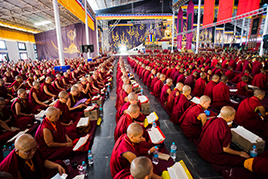
37th Kagyu Monlam Schedule
Tibetan / English / Chinese • French • German • Indonesian • Korean • Polish • Russian • Spanish • Vietnamese
Dharma Teachings
 Meditation Instructions
Meditation Instructions
Recorded during the 37th Kagyu Monlam, Bodhgaya, India. January 28-30, 2020.

